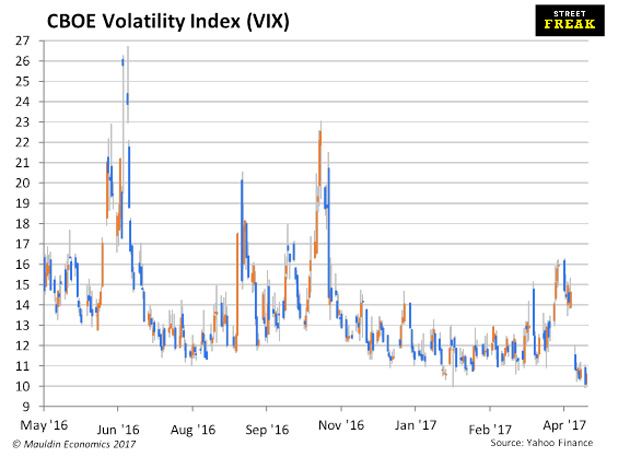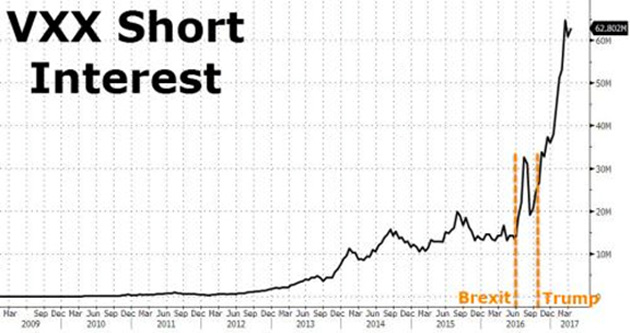| -- | May 4, 2017 Endogenous Risks  I’ve been yapping my trap about these vol-selling monkeys for some time—we may have finally reached peak vol absurdity. As you may have seen, the VIX dipped under 10 on an intraday basis the other day:  Meanwhile, short interest has reached an all-time high in VXX, the ETN that is supposed to track the VIX.. Remember, if you buy VXX you are getting long volatility, so basically what we are seeing is an overabundance of people rushing in to sell volatility… at the all-time lows. 
Source: Zerohedge No bubble here. We spent last week talking about bubbles—is there a bubble in short volatility strategies? I think there might be. Please stop and read this terrific piece by Dean Curnutt, CEO of Macro Risk Advisors, on Bloomberg View. In it, he talks about the idea that financial insurance is different than conventional insurance. With insurance against hurricanes or fires, for example, the event you are trying to insure against is truly exogenous. Hurricanes (for all intents and purposes) are independent events, and occur without respect to how many people buy insurance. But that is not the case with financial markets insurance (like options). As opposed to earthquakes, which are exogenous events, a crash (caused by a rapid unwinding of positions) can be an endogenous event, as Curnutt explains. People put on a trade, it works, which encourages more and more people to pile in… until it eventually stops working. Then everyone will want to get out—all at once. As I have written before, selling volatility has worked so well for so long that many people believe it to be free money. Shorting VXX works when volatility goes down and the term structure of volatility steepens. What happens if volatility goes up and the term structure inverts—and stays inverted? Road pizza. I try not to bring this up in mixed company, but this is just one of many dashboard warning lights that are flashing magenta right now. The other ones I talk about all the time are overheated housing markets in Canada, Australia and Sweden—it appears that Canada is cresting as we speak. But what I really want to talk about is the idea that we might possibly have an indexing bubble. Is There An Indexing Bubble? Everyone knows by now that assets have been fleeing actively managed funds into passively managed mutual funds and ETFs. It’s an old story. Everyone knows about the popularity of Vanguard. Some people have made their reputations on this. The story is compelling—invest in this product that usually beats most competitors but costs a lot less. Where do I sign up? I’ll poke holes in that logic some other time. For now, I want to talk about the idea that this strategy has become so popular that it is a bubble in and of itself. This is a frequent topic of discussion online. The index fund bulls/promoters usually point out that just a small fraction of assets have switched to passive—there could be a lot more to go. That is true. The index fund bears/detractors point out all the distortions that are happening from indexing, like: - It has ruined long/short strategies
- It is screwing up corporate governance
- It is causing valuation distortions
Entertain this thought for a moment. If you lived through the dot-com crisis, you remember what that was like. People day-trading at their desks at work, cab drivers giving you stock tips, all that kind of stuff. Mania. The stuff we were talking about two weeks ago. What if indexing is a mania unto its own? Clearly, there isn’t the euphoria there was in 1999, but people are pretty excited about their index funds. Excited enough that Vanguard gets $2 billion in new assets a day. Meanwhile, long-short guys have a tough time scratching together $50 million for a launch. People aren’t bullish on stocks--they are bullish on the stock market. And philosophically, nobody is really thinking about the S&P 500 stocks as 500 stocks. They are thinking about it as an asset unto itself. It has a price. And, when people talk about indices, they don’t talk about the benefits of diversification anymore. Remember how this stuff works—you don’t necessarily need an exogenous shock for this trade to fall apart. As previously described, greed takes over, and it can just stop working and unwind. What would an indexing unwind look like? Down 20%--thought you were diversified! Just Spitballing Here Just kicking some ideas around. Privately, I would say that, while popular, indexing may not have reached bubble stages yet. This is all new territory, so I don’t know. What I do know is that stocks in the U.S. have become very expensive, which should not be a controversial statement. I don’t really want to own expensive stocks. Neither should you. In the Street Freak portfolio, there are only a handful of U.S. stocks. And most of them are not expensive. There are lots of opportunities that are not stocks in the S&P 500 Index. There are lots of places in the world that are attractive right now. It just takes a little digging. That’s what I do for my subscribers. One final thing (and this is important)—I’d like to invite you all to become subscribers to my new podcast The Monthly Dirtcast. In my writing I tend to be the blind-you-with-science gearhead, but this is a very different sort of financial podcast. It’s not all about markets and macro. It’s about finance, highbrow—and lowbrow. In my latest episode, I interview a broker who buys and sells dental practices. Sounds boring, until you learn that private equity is getting involved. Check it out! I think it’s one of the best finance podcasts out there. I can offer you a money back guarantee. (It’s free.) 
Jared Dillian
Editor, The 10th Man
 | Get Thought-Provoking Contrarian Insights from Jared Dillian
Meet Jared Dillian, former Wall Street trader, fearless contrarian, and maybe the most original investment analyst and writer today. His weekly newsletter, The 10th Man, will not just make you a better investor—it's also truly addictive. Get it free in your inbox every Thursday. |
Jared's premium investment service, Street Freak, is available now. Click here for our introductory offer. Jared Dillian, former head of ETF Trading at one of the biggest Wall Street firms and author of the highly acclaimed books, Street Freak: Money and Madness at Lehman Brothers , and All the Evil of This World , shows you how to pick and trad e trends, and master your inner instincts. Learn how to use “Angry Analytics” as a leading indicator of budding trends you can profit from… and how to view any market situation through the lens of a trader. Jared’s keen insight into market psychology combined with an edgy, provocative voice make Street Freak an investment advisory like no other. Follow Jared on Twitter at @dailydirtnap. Share Your Thoughts on This Article
 http://www.mauldineconomics.com/members
Use of this content, the Mauldin Economics website, and related sites and applications is provided under the Mauldin Economics Terms & Conditions of Use. Unauthorized Disclosure Prohibited The information provided in this publication is private, privileged, and confidential information, licensed for your sole individual use as a subscriber. Mauldin Economics reserves all rights to the content of this publication and related materials. Forwarding, copying, disseminating, or distributing this report in whole or in part, including substantial quotation of any portion the publication or any release of specific investment recommendations, is strictly prohibited.
Participation in such activity is grounds for immediate termination of all subscriptions of registered subscribers deemed to be involved at Mauldin Economics’ sole discretion, may violate the copyright laws of the United States, and may subject the violator to legal prosecution. Mauldin Economics reserves the right to monitor the use of this publication without disclosure by any electronic means it deems necessary and may change those means without notice at any time. If you have received this publication and are not the intended subscriber, please contact service@mauldineconomics.com. Disclaimers The Mauldin Economics website, Yield Shark, Thoughts from the Frontline, Patrick Cox’s Tech Digest, Outside the Box, Over My Shoulder, World Money Analyst, Street Freak, Just One Trade, Transformational Technology Alert, Rational Bear, The 10th Man, Connecting the Dots, This Week in Geopolitics, Stray Reflections, and Conversations are published by Mauldin Economics, LLC. Information contained in such publications is obtained from sources believed to be reliable, but its accuracy cannot be guaranteed. The information contained in such publications is not intended to constitute individual investment advice and is not designed to meet your personal financial situation. The opinions expressed in such publications are those of the publisher and are subject to change without notice. The information in such publications may become outdated and there is no obligation to update any such information. You are advised to discuss with your financi al advisers your investment options and whether any investment is suitable for your specific needs prior to making any investments.
John Mauldin, Mauldin Economics, LLC and other entities in which he has an interest, employees, officers, family, and associates may from time to time have positions in the securities or commodities covered in these publications or web site. Corporate policies are in effect that attempt to avoid potential conflicts of interest and resolve conflicts of interest that do arise in a timely fashion.
Mauldin Economics, LLC reserves the right to cancel any subscription at any time, and if it does so it will promptly refund to the subscriber the amount of the subscription payment previously received relating to the remaining subscription period. Cancellation of a subscription may result from any unauthorized use or reproduction or rebroadcast of any Mauldin Economics publication or website, any infringement or misappropriation of Mauldin Economics, LLC’s proprietary rights, or any other reason determined in the sole discretion of Mauldin Economics, LLC. Affiliate Notice Mauldin Economics has affiliate agreements in place that may include fee sharing. If you have a website or newsletter and would like to be considered for inclusion in the Mauldin Economics affiliate program, please go to http://affiliates.pubrm.net/signup/me. Likewise, from time to time Mauldin Economics may engage in affiliate programs offered by other companies, though corporate policy firmly dictates that such agreements will have no influence on any product or service recommendations, nor alter the pricing that would otherwise be available in absence of such an agreement. As always, it is important that you do your own due diligence before transacting any business with any firm, for any product or service. © Copyright 2017 Mauldin Economics | -- |
